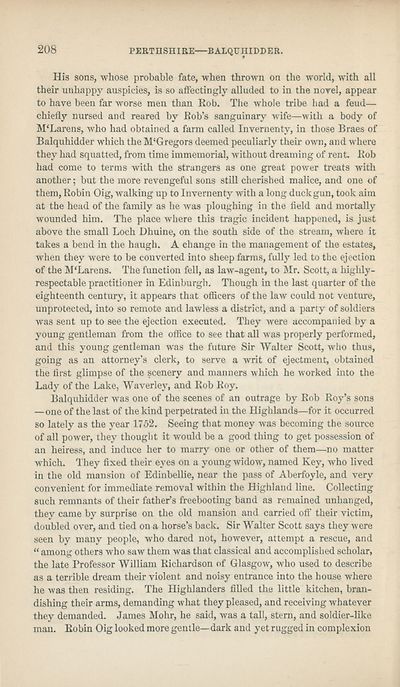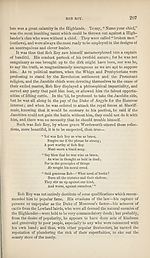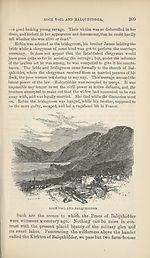Download files
Complete book:
Individual page:
Thumbnail gallery: Grid view | List view

208
PERTHSHIRE—BALQUHIDDER.
His sons, whose probable fate, when thrown on the world, with all
their unhappy auspieies, is so affectingly alluded to in the norel, appear
to have been far worse men than Rob. The whole tribe had a feud—
chiefly nursed and reared by Rob’s sanguinary wife—with a body of
M'Larens, who had obtained a farm called Invernenty, in those Braes of
Balquhidder which the M'Gregors deemed peculiarly their own, and where
they had squatted, from time immemorial, without dreaming of rent. Rob
had come to terms with the strangers as one great power treats with
another; but the more revengeful sons still cherished malice, and one of
them, Robin Oig, walking up to Invernenty with a long duck gun, took aim
at the head of the family as he was ploughing in the field and mortally
wounded him. The place where this tragic incident happened, is just
above the small Loch Dhuine, on the south side of the stream, where it
takes a bend in the haugh. A change in the management of the estates,
when they were to be converted into sheep farms, fully led to the ejection
of the M'Larens. The function fell, as law-agent, to Mr. Scott, a highly-
respectable practitioner in Edinburgh. Though in the last quarter of the
eighteenth century, it appears that otficers of the law could not venture,
unprotected, into so remote and lawless a district, and a party of soldiers
was sent up to see the ejection executed. They were accompanied by a
young gentleman from the office to see that all was properly performed,
and this young gentleman was the future Sir Walter Scott, who thus,
going as an attorney’s clerk, to serve a writ of ejectment, obtained
the first glimpse of the scenery and manners which he worked into the
Lady of the Lake, Waverley, and Rob Roy.
Balquhidder was one of the scenes of an outrage by Rob Roy’s sons
—one of the last of the kind perpetrated in the Highlands—for it occurred
so lately as the year 1752. Seeing that money was becoming the source
of all power, they thought it would be a good thing to get possession of
an heiress, and induce her to marry one or other of them—no matter
which. They fixed their eyes on a young widow, named Key, who lived
in the old mansion of Edinbellie, near the pass of Aberfoyle, and very
convenient for immediate removal within the Highland line. Collecting
such remnants of their father’s freebooting band as remained unhanged,
they came by surprise on the old mansion and carried off their victim,
doubled over, and tied on a horse’s back. Sir Walter Scott says they were
seen by many people, who dared not, however, attempt a rescue, and
“ among others who saw them was that classical and accomplished scholar,
the late Professor William Richardson of Glasgow, who used to describe
as a terrible dream their violent and noisy entrance into the house where
he was then residing. The Highlanders filled the little kitchen, bran¬
dishing their arms, demanding what they pleased, and receiving whatever
they demanded. James Mohr, he said, was a tall, stern, and soldier-like
man. Robin Oig looked more gentle—dark and yet rugged in complexion
PERTHSHIRE—BALQUHIDDER.
His sons, whose probable fate, when thrown on the world, with all
their unhappy auspieies, is so affectingly alluded to in the norel, appear
to have been far worse men than Rob. The whole tribe had a feud—
chiefly nursed and reared by Rob’s sanguinary wife—with a body of
M'Larens, who had obtained a farm called Invernenty, in those Braes of
Balquhidder which the M'Gregors deemed peculiarly their own, and where
they had squatted, from time immemorial, without dreaming of rent. Rob
had come to terms with the strangers as one great power treats with
another; but the more revengeful sons still cherished malice, and one of
them, Robin Oig, walking up to Invernenty with a long duck gun, took aim
at the head of the family as he was ploughing in the field and mortally
wounded him. The place where this tragic incident happened, is just
above the small Loch Dhuine, on the south side of the stream, where it
takes a bend in the haugh. A change in the management of the estates,
when they were to be converted into sheep farms, fully led to the ejection
of the M'Larens. The function fell, as law-agent, to Mr. Scott, a highly-
respectable practitioner in Edinburgh. Though in the last quarter of the
eighteenth century, it appears that otficers of the law could not venture,
unprotected, into so remote and lawless a district, and a party of soldiers
was sent up to see the ejection executed. They were accompanied by a
young gentleman from the office to see that all was properly performed,
and this young gentleman was the future Sir Walter Scott, who thus,
going as an attorney’s clerk, to serve a writ of ejectment, obtained
the first glimpse of the scenery and manners which he worked into the
Lady of the Lake, Waverley, and Rob Roy.
Balquhidder was one of the scenes of an outrage by Rob Roy’s sons
—one of the last of the kind perpetrated in the Highlands—for it occurred
so lately as the year 1752. Seeing that money was becoming the source
of all power, they thought it would be a good thing to get possession of
an heiress, and induce her to marry one or other of them—no matter
which. They fixed their eyes on a young widow, named Key, who lived
in the old mansion of Edinbellie, near the pass of Aberfoyle, and very
convenient for immediate removal within the Highland line. Collecting
such remnants of their father’s freebooting band as remained unhanged,
they came by surprise on the old mansion and carried off their victim,
doubled over, and tied on a horse’s back. Sir Walter Scott says they were
seen by many people, who dared not, however, attempt a rescue, and
“ among others who saw them was that classical and accomplished scholar,
the late Professor William Richardson of Glasgow, who used to describe
as a terrible dream their violent and noisy entrance into the house where
he was then residing. The Highlanders filled the little kitchen, bran¬
dishing their arms, demanding what they pleased, and receiving whatever
they demanded. James Mohr, he said, was a tall, stern, and soldier-like
man. Robin Oig looked more gentle—dark and yet rugged in complexion
Set display mode to:
![]() Universal Viewer |
Universal Viewer | ![]() Mirador |
Large image | Transcription
Mirador |
Large image | Transcription
| Antiquarian books of Scotland > Scotland/Scots > Black's picturesque tourist of Scotland > (288) |
|---|
| Permanent URL | https://digital.nls.uk/130031646 |
|---|
| Description | Thousands of printed books from the Antiquarian Books of Scotland collection which dates from 1641 to the 1980s. The collection consists of 14,800 books which were published in Scotland or have a Scottish connection, e.g. through the author, printer or owner. Subjects covered include sport, education, diseases, adventure, occupations, Jacobites, politics and religion. Among the 29 languages represented are English, Gaelic, Italian, French, Russian and Swedish. |
|---|

